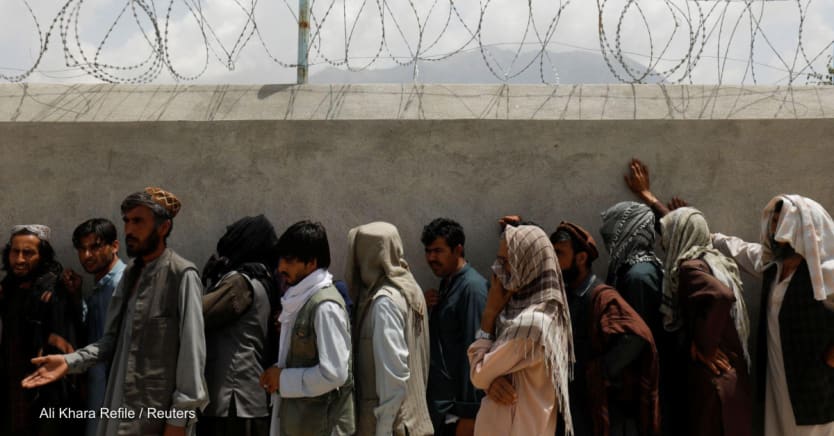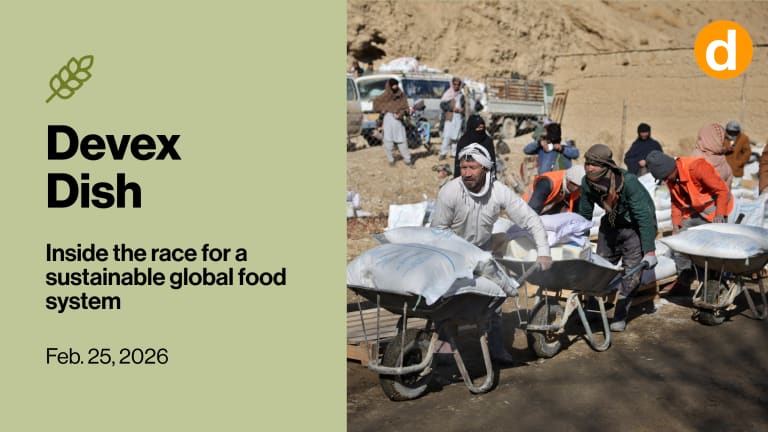
The European Commission wants to expand the kind of funding it can provide in Afghanistan, telling European Union states this month that “Aid is not enough, Afghan people want income and jobs, i.e. the economy to improve.”
Documents seen by Devex show the commission wants to “refine” the “basic needs approach” that it agreed with EU countries last fall, in the wake of the Taliban’s return to power. Under that policy, EU assistance could only be implemented by NGOs and international organizations to address people’s basic needs, such as health care, education, and nutrition, and to support human rights, including women’s rights.
The commission says those principles “remain the compass” and no funds or equipment should be channeled through the “de facto authorities.” However, Brussels wants to expand the “situations and sectors” it can work in to include those with a medium-to-long-term perspective. It wants support for livelihoods “to include the private sector and business,” for instance. And greater support is envisaged for technical and vocational education and training, independent media, and building resilience in the face of drought, desertification, water scarcity, and earthquakes.
On the economic situation, the commission proposed that “Financial and economic recovery and stabilisation can be pursued by supporting core public and private financial sector institutions in macroeconomic management. This can include strengthening the capacity of the Central Bank of Afghanistan’s functions (e.g. safeguards to establish and maintain its independence and respect of AML/CFT standards).”
Meanwhile, when it comes to completing unfinished infrastructure projects, such as electrification and road networks, the commission proposed that these “can be considered on a case-by-case based on the counterfactual (what if) assessment of not completing these projects, factoring in significantly higher costs of recovering the costs of these infrastructures at a later stage, as well as the critical repercussion on the livelihoods of the beneficiary populations, for the humanitarian and basic needs assistance delivery in the immediate and the broader recovery in the long run.”
Citing movements from others, such as the World Bank’s repurposing of the Afghanistan Reconstruction Trust Fund and discussions in the United Nations-led Afghanistan Coordination Group on how to support the country’s economy, the commission wrote that “the time is now ripe for the EU to position itself so that efforts to support economic recovery and stabilisation to the benefit of the people of Afghanistan are provided in a coherent manner.”
“Experience from past months’ implementation and contacts with partners, international NGOs and think tanks shows a growing consensus that humanitarian aid and basic needs assistance are important but not sufficient,” the commission added.
The proposed changes will be discussed at a meeting of development officials from EU states’ on Monday. Sources told Devex that at a preparatory discussion among EU national representatives in Brussels on Wednesday evening, countries were reluctant to immediately agree to the commission’s plan, with some arguing that more time is required to study the approach and possible consequences.
The basic needs support is distinct from the EU’s humanitarian aid to Afghanistan, as it is drawn from the budget instrument for development assistance. It was the subject of a minor turf war between the commission’s humanitarian aid and development departments last year.
The commission told member states that since August 2021 — as part of its ongoing basic needs support through NGOs and the U.N. — it has programs worth €79 million on forced displacement and migration; €65.2 million for livelihoods; €60 million for health; €66 million for education; and €3.3 million for human rights, gender, and civil society.
In its latest proposal to member states, the commission wrote that the socioeconomic collapse of the country “would result in increased instability, severe security threats and migratory flows in Afghanistan, the region and beyond, with a direct impact on the Union.”
Search for articles
Most Read
- 1
- 2
- 3
- 4
- 5








